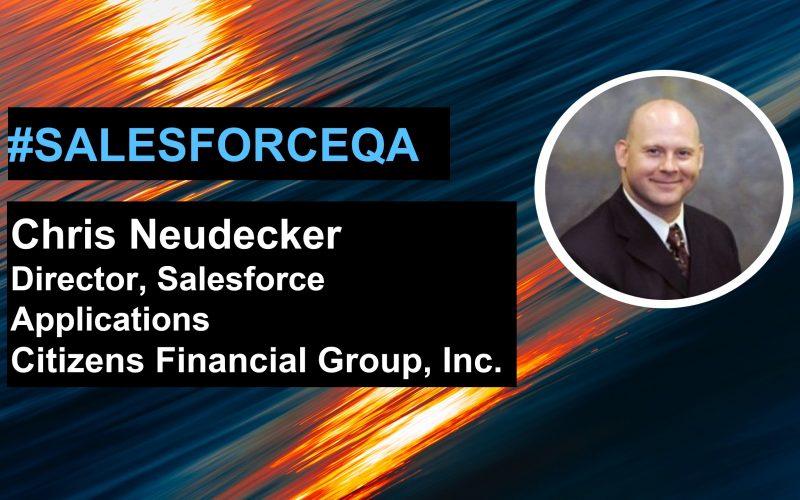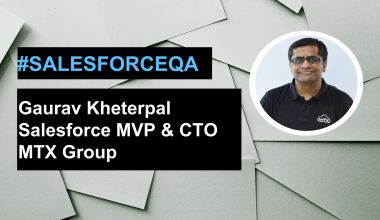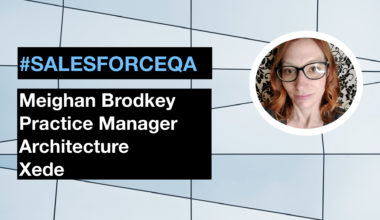In our most recent #SalesforceQA, we caught up with Chris Neudecker, Salesforce Technical Architect and Director of Salesforce Applications at Citizens Financial Group, Inc.
Chris offers his advice for those looking for career progression within the ecosystem and discusses what Salesforce professionals should be learning to stay relevant in the next 5-10 years. Chris also mentions the key skills he looks for when hiring Salesforce talent into the team.
Salesforce Republic (SR): Could you talk us through how you got into a career in Salesforce and how you got to where you are today?
Chris Neudecker (CN): I feel into it – literally – it was by pure chance. I was laid off from work, and had a confidant who introduced me to a group that could not afford to hire a company to get them to “transform” from one system to another. Long story short, I lucked into being the person who helped them, and that system was SFDC.
SR: What advice would you give someone looking for career progression within the ecosystem?
CN: DO NOT view progression through “job labels.” There is a path for everyone, and if you follow the areas that interest you the most, you’ll end up become a professional in that area…just by following that passion you will see opportunities open up for you.
Additionally, you have to network with people. As reclusive as we tend to be, people do not show up at your doorstep to offer you career advancements. You have to network, internally with your peers, and externally with others. The more connections you make, the greater chances you have to advance.
Post small articles on your experience. Blogs, LinkedIn articles…anything that will help push your name out there. You will plant seeds, and those seeds will grow for you.
SR: What key skills do you look for when hiring Salesforce talent into your team?
CN:
- Personality :
I do not care how great a person is with Salesforce, their experiences with it, or their past work experiences. I care that they are upbeat, want to get better everyday, willing to learn, willing to expand their perspectives.
- Constant Learner:
I want people who want to understand more, not just about SFDC, but other technologies too…
and I don’t want them to settle for less.
SR: In your experience, what should Salesforce professionals be learning to stay relevant in the next 5-10 years?
CN: Great question, and it is difficult to predict what to focus on because Salesforce acquires so many companies, and changes at such a fast pace. For that matter, it wouldn’t be inconceivable that Salesforce is acquired by Apple or Amazon within the 5-10 yr timeframe.
Therefore, the best thing to do is to become a business visionary expert. Focus on improving time-to-market skills. Whether that is working on automation items, Einstein items, Service Items or Experience items; anything that can help most companies speed up processes and understand their own relative data aspects will help you as a professional.
Nothing substitutes from you working in your sandbox. No matter how many trailhead points you accumulate or certificates you pass, your understanding of how issues work in your sandbox is the most relevant skill today, and in the future.
For a better understanding, passing a State Bar Exam will never determine your level of success at being a lawyer. Matter of fact, that Exam will NOT provide you with skills to practicing Law. It will not do such. It tests your understanding of that State’s legal rules, but never your ability to actually run your own legal practice. That’s because there is so much more to running a practice than just understanding the law.
Same for being a mechanic. I can read all day about rebuilding a diesel engine on a car; however, until I actually take an engine apart and attempt to put it back together bit by bit, then, I will only understand the difficulty faced.
That is why Sandboxes are relevant to your skill knowledge.
Let’s be honest, Salesforce’s reading guides are not always in sync with the system updates. So reading something might be “off” compared to what is truly going on within a system.
And everyone’s system is created differently too. All businesses run their systems differently. Not all boxes are the same. Thus, you have to tinker with them differently.
SR: In your opinion have the events of the past year impacted digital transformation goals for organisations?
CN: Yes they have.
Most companies were truly exposed by their lack of digital effectiveness, as well as, most regulatory agencies, and municipalities. Few truly had a “disaster plan” for this type of event.
That kind of exposure makes most companies rethink their current processes and systems.
Therefore, companies will need to invest in their technology suite more so than expected. Will they? Probably not as they should, but each industry is unique and affected differently – but the ones that can afford to transform should do so immediately; they will see the quickest gains from their investment.
SR: What are your top tips for making digital transformation work?
CN: You’d best be ready for a culture change too.
If a company’s IT group is mismanaged because it has too many chiefs, opposing technology stack views, and believes that everything should be developed by using multiple systems – then transformation will take years and never get moving.
There must be an agreement between the Business Side and Technology side, as to how transformation should occur.
Tech MUST have an architecture map for business to understand, and have a viewing section to show business where things stand. Doing weekly SCRUM updates won’t cut it.
You need to have viewer dashboards sent to Business executives daily.
Your Lucidchart /Drawio /Miro Board or charts should be distributed to them as well. That way they can see how things are changing at the same time.
Each company MUST Be disciplined to document and crate a process system that shows how the architecture changes, and how processes are managed.
Companies MUST understand the importance of having a system architect who is in charge of mapping and diagraming and keeping everything up-to-date. If that person leaves, you need to hire another and not let these items fall by the way side.
The IT world is hyper-competitive for resources so you have to make sure your IT team does not fail your business. That means keeping the spots filled.
That is my biggest tip for anyone. If your team is not in alignment, then your transformation will not be aligned.
SR: Finally, what is the best piece of advice you have received throughout your career?
CN: No matter how hard you try, you will never know “everything” about Salesforce. Do not become frustrated because of such. It is a huge system, and always growing. Understand the premise of the system and work outwardly to solve your needs.
Be thankful and humble that you work in this ecosystem, because it can help you prosper as well.
If you’re a Salesforce professional and would like to join Chris in our Q&A series, please get in touch with us today!


